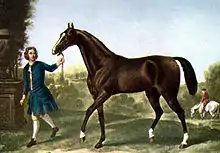sire
English
Etymology
From Middle English sire, from Old French sire, the nominative singular of seignor; from Latin senior, from senex. Doublet of senior, seigneur, seignior, sir, and monsieur.
Pronunciation
- IPA(key): /saɪə(ɹ)/
- Rhymes: -aɪə(ɹ)
Audio (UK) (file)
.jpg.webp)

Noun
sire (plural sires)
- A lord, master, or other person in authority, most commonly used vocatively: formerly in speaking to elders and superiors, later only when addressing a sovereign.
- A male animal that has fathered a particular offspring (especially used of domestic animals and/or in biological research).
- (obsolete) A father; the head of a family; the husband.
- c. 1591–1592 (date written), William Shakespeare, “The Third Part of Henry the Sixt, […]”, in Mr. William Shakespeares Comedies, Histories, & Tragedies […] (First Folio), London: […] Isaac Iaggard, and Ed[ward] Blount, published 1623, OCLC 606515358, [Act III, scene ii]:
- And raise his issue, like a loving sire.
-
- (obsolete) A creator; a maker; an author; an originator.
- 1821, Percy B[ysshe] Shelley, Adonais: An Elegy on the Death of John Keats, […], Pisa, Italy: […] Didot; reprinted London: Noel Douglas […], 1927, OCLC 1156441409, stanza IV, page 8:
- Most musical of mourners, weep again! / Lament anew, Urania!—He died, / Who was the sire of an immortal strain, […]
-
Coordinate terms
- (male animal): dam
Translations
|
|
Verb
sire (third-person singular simple present sires, present participle siring, simple past and past participle sired)
- (transitive, of a male) to father; to beget.
- 1994, Nelson Mandela, Long Walk to Freedom, Abacus, published 2010, page 6:
- In these travels, my father sired thirteen children in all, four boys and nine girls.
-
Translations
|
Anagrams
- EIRs, Eris, Iser, SIer, Seri, eirs, ires, reis, rise
Danish
Etymology
From German zieren.
Verb
sire
- (archaic) adorn
- (archaic, by extension, especially in the passive participle) endow with a favorable quality
Derived terms
- vansire
References
- “sire” in Ordbog over det danske Sprog
French
Etymology
From Old French sire (nominative form), from Vulgar Latin *seior (used as a term of address), a contracted form of Latin senior (compare French seigneur, derived from the accusative form), perhaps influenced by maior. Doublet of seigneur, senior, and sieur.
Pronunciation
- IPA(key): /siʁ/
- Rhymes: -iʁ
- Homophones: cire, cirent, cires, sires
Noun
sire m (plural sires)
- (obsolete) sire (term of respect) (Still used in at least partly French-speaking kingdoms such as Belgium or Canada as a form of address to the sovereign)
- (obsolete) lord
Derived terms
- triste sire
Related terms
- monsieur
- seigneur
Further reading
- “sire”, in Trésor de la langue française informatisé [Digitized Treasury of the French Language], 2012.
Anagrams
- ries
Italian
Etymology
Borrowed from Old French sire. See also sere. Doublet of signore.
Pronunciation
- IPA(key): /ˈsi.re/
- Rhymes: -ire
- Hyphenation: sì‧re
Noun
sire m (invariable)
- king, monarch (only when addressing a sovereign)
- Synonyms: re, sovrano, monarca, maestà
Anagrams
- Eris, IRES, ersi, resi, rise, seri
Middle English
Alternative forms
- sir, sirre, syre, syr, seere, ser, sure, sore
- ẜ
Etymology
From Old French sire, nominative singular of seignor, from Latin senior. Doublet of senyour.
Pronunciation
- IPA(key): /ˈsiːr(ə)/, /ˈsir(ə)/, /ˈsɛr(ə)/
Noun
sire (plural sires)
- Used preceding the name or title of a knight, noble, or cleric.
- A respectful term of address for a noble or gentleman.
- A noble or lord; one of high station.
- A husband as the head of a household.
- A father as one's progenitor.
Descendants
- English: sir; sire
- Scots: sir; sire
References
- “sī̆r(e, n.”, in MED Online, Ann Arbor, Mich.: University of Michigan, 2007.
Old French
Pronunciation
- IPA(key): /ˈsi.rə/
Noun
sire m
- nominative singular of sieur
Pali
Alternative forms
- 𑀲𑀺𑀭𑁂 (Brahmi script)
- सिरे (Devanagari script)
- সিরে (Bengali script)
- සිරෙ (Sinhalese script)
- သိရေ (Burmese script)
- สิเร (Thai script)
- ᩈᩥᩁᩮ (Tai Tham script)
- ສິເຣ (Lao script)
- សិរេ (Khmer script)
- 𑄥𑄨𑄢𑄬 (Chakma script)
Noun
sire
- locative singular of siras
Romanian
Etymology
From French sire.
Noun
sire m (uncountable)
- sire
Declension
| singular | ||
|---|---|---|
| m gender | indefinite articulation | definite articulation |
| nominative/accusative | (un) sire | sireul |
| genitive/dative | (unui) sire | sireului |
| vocative | sireule | |
Serbo-Croatian
Verb
sire (Cyrillic spelling сире)
- third-person plural present of siriti
Slovene
Noun
sire
- accusative plural of sir